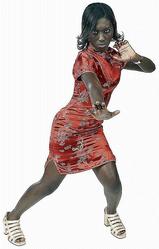
Eulalee Thompson
By his own admission, 'Jim' couldn't believe his lucky stars when he had met a 'nice, slim, brown-skinned girl'; this type, apparently, being the average Jamaican man's dream mate. He was, however, in for a very rude awakening; it didn't take long before he discovered that 'all that glitters is not gold'.
"She was a storyteller, yes, by that I mean a liar. I was always trying to decipher the lies," he said.
According to 'Jim', his mate didn't only 'tell stories', but was a 'man batterer'.
"I was abused and I am not saying that I took it all the time, but she always threw the first punch," he said.
The abuse started immediately after the relationship was established, but 'Jim' said that he endured both the relationship and the abuse, on-and-off for four years mainly because of the "two beautiful children" produced by the partnership.
"Once, for instance, while we were driving to the country, she asked me a question and I said 'no', she started to rain down blows on my head and the kids were there in the back of the car. In the early days, I would not retaliate, but I turned and slapped her," he said. "In front of the children, she would fight, if I ignored her or said something she didn't like, she would start a fight, she has even pulled a knife on me, set her boyfriend on me and poured gasolene on my car with the intention to set it alight."
Who are the abusers?


He said that initially, they were living as a couple in the United States and so he "couldn't hit back because of the strict domestic violence laws there". However, he did hit back once and was arrested, jailed for more than a week and sent to anger management classes. As a result of this, 'Jim' lost his job and the family was thrown out of their apartment.
"But I was always taking her back because of the children and then finally I told her to leave," he said.
Who are the abusers? Based on research by social psychologist, Carolyn Graham, they are people with many unresolved childhood issues. They usually have problems in their relationships with their parents. The women abusers in her study did not have healthy relationships with their fathers; they blamed their fathers for promises not kept and for not treating their mothers well.
Ms. Graham said that the women in her study "seem to be defending themselves, not against their husbands, but against experiences in childhood."
The abused men also reported deficiencies in their parental relationships and childhood experiences which may have contributed to their roles as victims. Ms. Graham noted that most of the men in her study generally had dysfunctional childhoods. Most of them received severe beatings in their childhoods, lived in homes where there was little or no love and happiness, moved house many times and witnessed one parent abusing the other.
With such similarities in the personal histories of male and female abusers and abused, Ms. Graham says this speaks to the importance of de-gendering the issue of domestic violence.
email: eulalee.thompson@gleanerjm.com.

